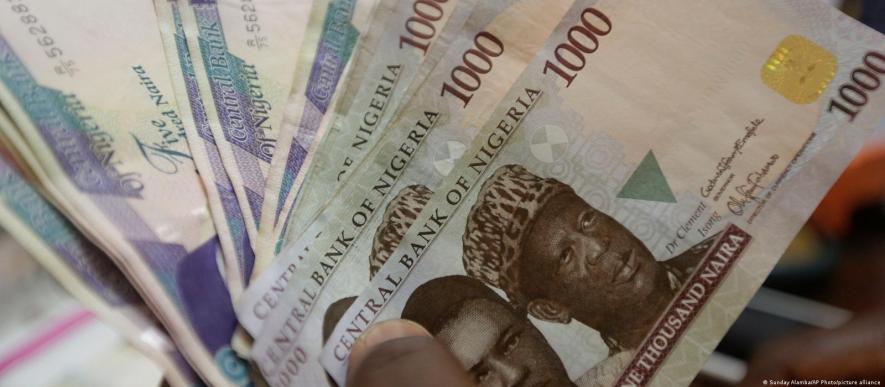Nigeria's New Cash Limit Leaves Traders in The Lurch

Nigerians will soon be unable to withdraw more than 20,000 naira (€42 or $44) daily and 500,000 naira weekly from ATMs as the government attempts to mop up excess cash in circulation and increase the use of digital banking in Nigeria.
The announcement of the policy, which comes into force on January 9, came a week after the government officially launched newly designed naira banknotes.
Though experts say the policies make sense in theory, they warn that poor timing may decrease their effectiveness. Nigeria's economy is still reeling from multiple shocks, including the devaluation of the naira and the fallout from the coronavirus pandemic.
Traders on edge
Small-business owners are already bracing for a loss in revenue once the new laws come into full effect, with many relying heavily on cash-only sales.
"Little cash, bad market," Lagos trader Lukman Lasisi told DW. "We market people have very short-term customers. If you don't have enough cash to purchase what customers want, they won't [come to you]."
For the past 12 years, Lasisi has sold women's clothing at one of the busiest markets in Lagos. He fears that his already-struggling business will be forced to slow down significantly — or even shut down — while wealthier Nigerians who already use digital banking will be relatively protected from the shock.
"We carry cash; we are used to it," he said. "But they are high-class people: They don't go around with cash."
Businesses will be allowed to withdraw up to 5 million naira weekly — 4.5 million naira more than individuals. However, the clock is also ticking on the validity of the old 200, 500 and 1,000 naira notes, which will no longer be accepted as legal tender from January 31.
In an attempt to ease the transition, both the new and old notes are currently in circulation. However, locals say the new notes are still too scarce as the deadline approaches. DW was unable to find an example of a new naira note at multiple banks and ATMs in Lagos.
Some business owners have also refused to accept the new notes from customers, claiming that the oversaturated design makes it too easy to counterfeit.
"It looks like it's fake," a woman in Lagos told DW. "The first time I was given a 1,000-naira note, I was like: No, this has to be counterfeit."
Is demonetization stabilization?
Nigeria's president, Muhammadu Buhari, says the redesign of the naira is intended to combat illegal financial flows and corruption, while also increasing the value of the currency.
Meanwhile, the governor of the Central Bank of Nigeria, Godwin Emefiele, says the cash withdrawal restrictions will also allow the CBN to work more closely with the national Economic and Financial Crimes Commission to crack down on unlawful transactions.
![]()

President Buhari (R) and CBN Governor Emefiele presented the redesigned banknotes in November 2022Image: Sodiq Adelakun/Xinhua News Agency/picture alliance
Ultimately, both measures are part of the CBN's efforts to demonetize the economy and, eventually, stabilize it.
"Demonetization happens all around the world and is not unusual," economist Martha Sembe told DW.
"Nigeria has continually battled high inflation rates all year, starting from 15.6% in January to 21.5% in November."
Though the CBN's interventions were generally welcomed by economists, she said, they have likely been implemented at the wrong time and too quickly, leaving small business owners and their families to bear the burden.
"Enduring high inflation all year, along with high food and energy costs, the last thing Nigerians need to worry about now is trooping en masse into banking halls to change naira notes," Sembe said.
Buhari's economic record in focus ahead of election
Throughout his eight years and two terms in office, Buhari repeatedly promised to revitalize Nigeria's economy. However, the opposite has come to pass: from 2015 to 2020, the country's economy grew so slowly that the average Nigerian got poorer — taking inflation into account.
From 2015 through 2022, Nigeria's public-debt profile soared from about 12.6 trillion naira to 44 trillion naira. The government currently owes the central bank a record 22 trillion naira.
![]()

Small businesses and traders are more likely to struggle under Nigeria's new cash lawsImage: P. U. Ekpei/AFP/Getty Images
Economist Kola Ayeye said the government should be more concerned with paying off its own debt than with burdening ordinary people with potentially harsh economic measures.
"The total money supply is somewhere around 46 trillion naira, and the total amount of cash outside banks is only 2.7 trillion naira," Ayeye said. "So all of this effort being spent on cash is really only 6% of the money supply."
"This debt is not only huge: It's also illegal," Ayeye said. "It has contributed to the devaluation of the currency, and it needs to be addressed."
Nigerians are sacheduled to head to the polls on February 25 in a much-anticipated general election that will also see a new president take office. The state of Nigeria's economy is expected to remain a major issue for voters.
Edited by: Ineke Mules
Get the latest reports & analysis with people's perspective on Protests, movements & deep analytical videos, discussions of the current affairs in your Telegram app. Subscribe to NewsClick's Telegram channel & get Real-Time updates on stories, as they get published on our website.
























